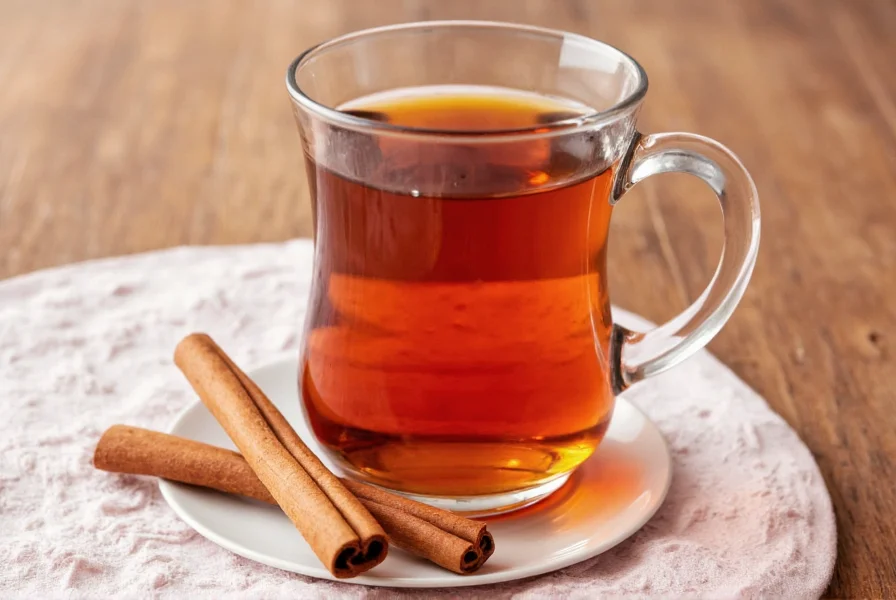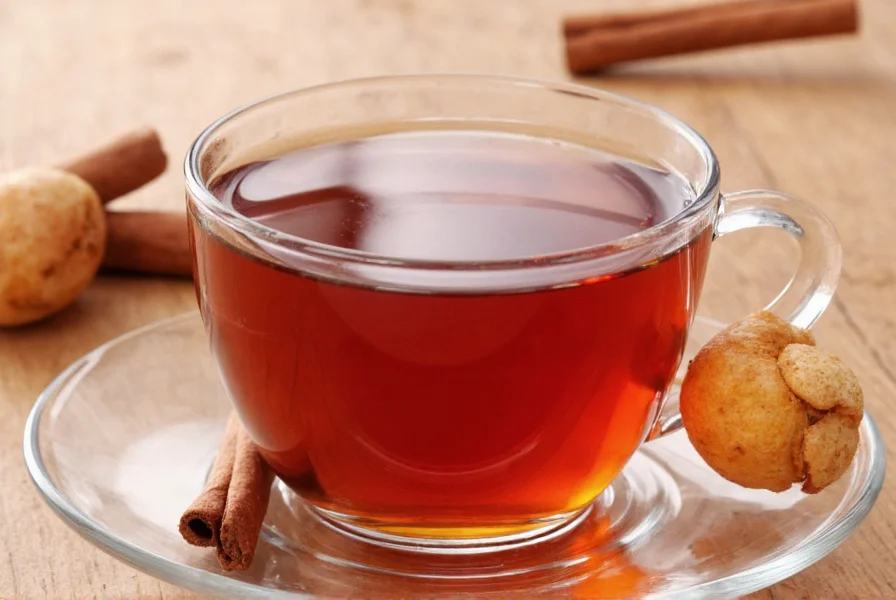Cinnamon tea, a simple infusion made from cinnamon bark steeped in hot water, has been consumed for centuries across various cultures for both its distinctive flavor and potential health properties. Unlike many herbal supplements that make exaggerated claims, cinnamon tea's advantages are increasingly supported by scientific research, though with important caveats about dosage and individual responses.
The Science Behind Cinnamon Tea's Health Properties
Cinnamon contains bioactive compounds, primarily cinnamaldehyde, which gives it its distinctive flavor and aroma while contributing to many of its health effects. When prepared as tea, these compounds are extracted into the water, creating a beverage with potential therapeutic properties. Unlike cinnamon supplements which can deliver concentrated doses, cinnamon tea typically provides a more moderate intake of these compounds, potentially reducing risk while still offering benefits.
Evidence-Supported Advantages of Cinnamon Tea
Blood Sugar Regulation and Insulin Sensitivity
One of the most researched benefits of cinnamon tea relates to blood sugar management. Multiple studies, including a comprehensive review published in the Journal of the Academy of Nutrition and Dietetics, indicate that cinnamon may improve insulin sensitivity and help moderate blood glucose levels after meals. The mechanism appears to involve cinnamon's ability to mimic insulin and enhance glucose uptake by cells. For individuals with prediabetes or type 2 diabetes, incorporating cinnamon tea into a balanced diet may provide modest support for blood sugar control, though it should never replace prescribed diabetes medications.
Potent Antioxidant Properties
Cinnamon ranks exceptionally high on the Oxygen Radical Absorbance Capacity (ORAC) scale, which measures a substance's antioxidant capacity. The tea form delivers these antioxidants in a readily absorbable liquid format. Research in Oxidative Medicine and Cellular Longevity demonstrates that cinnamon's polyphenols help combat oxidative stress, which is implicated in numerous chronic diseases and the aging process. Regular consumption of cinnamon tea may contribute to your daily antioxidant intake, supporting overall cellular health.
| Key Compound | Natural Source | Primary Health Benefit | Research Status |
|---|---|---|---|
| Cinnamaldehyde | Cinnamon bark | Anti-inflammatory, blood sugar regulation | Multiple human studies |
| Eugenol | Cinnamon essential oil | Antimicrobial properties | Preliminary research |
| Proanthocyanidins | Cinnamon bark | Antioxidant effects | Multiple in vitro studies |
| Coumarin | Cinnamon varieties | Potential liver toxicity at high doses | Well-documented |
Natural Anti-inflammatory Effects
Chronic inflammation underlies many modern health conditions, from arthritis to heart disease. Cinnamon tea contains compounds that may help reduce inflammatory markers in the body. A study in Nutrition Research found that cinnamon supplementation reduced levels of C-reactive protein, a key inflammation marker. While most research has used cinnamon supplements rather than tea specifically, the anti-inflammatory compounds are present in the tea form, though in lower concentrations.
Cardiovascular Health Support
Emerging research suggests cinnamon tea may contribute to heart health through multiple pathways. Studies indicate it may help lower LDL ("bad") cholesterol while maintaining HDL ("good") cholesterol levels. Additionally, cinnamon's potential blood pressure-lowering effects, though modest, could provide cardiovascular benefits when incorporated into a heart-healthy lifestyle. The American Journal of Clinical Nutrition published research showing cinnamon's positive effects on several cardiovascular risk factors.
Antimicrobial Properties
Cinnamon has demonstrated natural antimicrobial effects against certain bacteria and fungi. While drinking cinnamon tea won't replace medical treatments for infections, its mild antimicrobial properties might provide supportive benefits for oral health and general immunity. Some research suggests these properties could help reduce harmful bacteria in the digestive tract while supporting beneficial gut flora.

How to Prepare Cinnamon Tea for Maximum Benefits
Preparing cinnamon tea properly ensures you extract the maximum beneficial compounds while minimizing potential risks:
- Choose the right cinnamon: Opt for Ceylon cinnamon ("true cinnamon") rather than Cassia when possible, as it contains significantly less coumarin, a compound that can be harmful to the liver in large amounts.
- Proper steeping technique: Add 1-2 inches of cinnamon stick (or 1/2 teaspoon of powder) to 8 ounces of just-boiled water. Steep for 10-15 minutes to extract beneficial compounds without over-extracting potentially harmful ones.
- Enhance absorption: Adding a small amount of healthy fat (like a teaspoon of coconut oil) or black pepper may increase absorption of cinnamon's beneficial compounds.
- Timing matters: Consuming cinnamon tea with or after meals may provide the most benefit for blood sugar regulation.
Important Considerations and Potential Side Effects
While cinnamon tea offers potential health advantages, it's crucial to understand the limitations and potential risks:
- Coumarin content: Cassia cinnamon (the more common and less expensive variety) contains high levels of coumarin, which can cause liver damage in sensitive individuals or with excessive consumption. Limit Cassia cinnamon tea to 1-2 cups daily.
- Medication interactions: Cinnamon may interact with blood thinners, diabetes medications, and certain liver-metabolized drugs. Consult your healthcare provider if taking medications.
- Pregnancy considerations: While moderate culinary use is generally considered safe, pregnant women should avoid consuming large amounts of cinnamon tea.
- Allergic reactions: Some individuals may experience mouth sores or allergic reactions to cinnamon.
- Realistic expectations: Cinnamon tea provides modest health benefits as part of an overall healthy lifestyle, not as a miracle cure for serious medical conditions.
Integrating Cinnamon Tea Into a Balanced Wellness Routine
For those interested in incorporating cinnamon tea into their routine, consider these evidence-based recommendations:
- Start with small amounts (1 cup daily) to assess tolerance
- Choose Ceylon cinnamon when possible for regular consumption
- Consume with meals for potential blood sugar benefits
- Combine with other healthy lifestyle practices rather than relying on it as a standalone intervention
- Monitor how your body responds and discontinue if adverse effects occur
While cinnamon tea shows promise for various health benefits, it's essential to maintain realistic expectations. The advantages are generally modest and work best as part of a comprehensive approach to health that includes balanced nutrition, regular physical activity, adequate sleep, and stress management. Scientific research continues to explore cinnamon's potential therapeutic applications, but current evidence supports its role as a beneficial component of a healthy lifestyle rather than a medical treatment.

Frequently Asked Questions About Cinnamon Tea Benefits
How much cinnamon tea should I drink daily for health benefits?
For most adults, 1-2 cups of cinnamon tea daily provides potential benefits while minimizing risks. If using Cassia cinnamon (the more common variety), limit to 1 cup daily due to higher coumarin content. Ceylon cinnamon allows for slightly higher consumption (up to 2-3 cups) as it contains significantly less coumarin. Always consult with your healthcare provider if you have liver conditions or take medications.
Can cinnamon tea help with weight loss?
While cinnamon tea alone won't cause significant weight loss, it may support weight management efforts indirectly. Some research suggests cinnamon may help regulate blood sugar and reduce cravings for sweets, potentially supporting healthier eating patterns. Additionally, as a flavorful, low-calorie beverage, it can serve as a healthy alternative to sugary drinks. However, substantial weight loss requires comprehensive changes to diet and physical activity.
When is the best time to drink cinnamon tea for maximum benefits?
For blood sugar regulation benefits, consume cinnamon tea with or immediately after meals. Many people find drinking it in the morning supports healthy metabolism throughout the day. Some prefer it in the evening as it may promote relaxation, though individual responses vary. Avoid drinking large amounts close to bedtime if you notice it affects your sleep. Consistency matters more than specific timing - regular daily consumption yields better results than sporadic use.
What's the difference between Ceylon and Cassia cinnamon for tea?
Ceylon cinnamon ("true cinnamon") has a lighter, more delicate flavor and contains significantly less coumarin (about 0.04%) compared to Cassia cinnamon (2-5% coumarin). Coumarin can be harmful to the liver in large amounts, making Ceylon the safer choice for regular consumption. While Cassia is more common and less expensive, Ceylon is preferable for daily tea preparation, especially for those with liver concerns or who consume cinnamon regularly.
Can cinnamon tea interact with medications?
Yes, cinnamon tea may interact with certain medications. It can enhance the effects of diabetes medications, potentially causing blood sugar to drop too low. It may also interact with blood thinners like warfarin due to its coumarin content. Additionally, cinnamon might affect how the liver processes certain medications. If you take prescription medications, particularly for diabetes, blood clotting, or liver-metabolized drugs, consult your healthcare provider before regularly consuming cinnamon tea.











 浙公网安备
33010002000092号
浙公网安备
33010002000092号 浙B2-20120091-4
浙B2-20120091-4